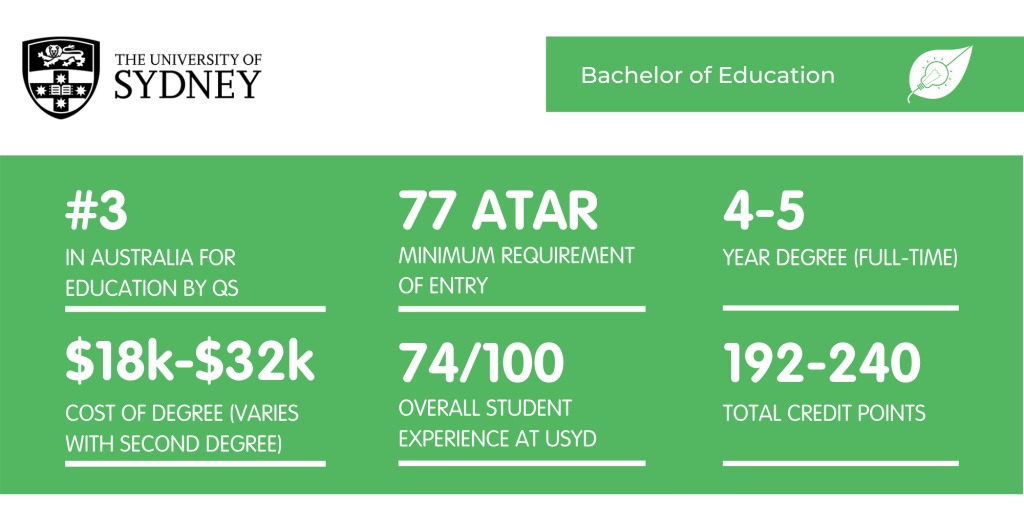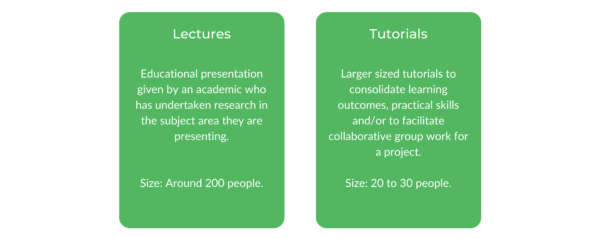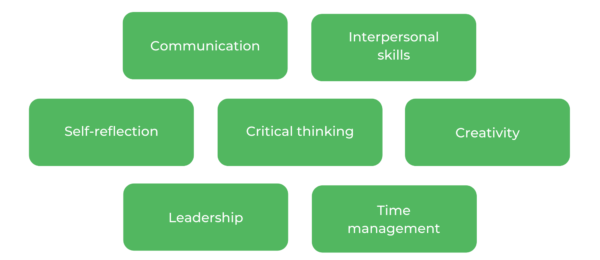Want to learn more about the Bachelor of Education at USYD?
Let us enlighten you with all you need to know about this degree! We’ll delve into its core units, contact hours, assessments, culture and more.
So, let’s get into it!
What is a Bachelor of Education at USYD?
Core Units and Majors
How to Get into a Bachelor of Education at USYD
What’s the Teaching Format?
What’s the Faculty and Culture Like?
What is a Bachelor of Education at USYD?
A Bachelor of Education at USYD preps you with the foundational knowledge and skills to become a well-rounded early childhood, primary or secondary teacher with courses accredited by the NSW Education Standards Authority (NESA).
USYD provides one Education degree for early childhood (birth to 5 years), one Education degree for primary level (K-6) and four Education degrees for secondary level teaching (Year 7-12).
| Type of Teaching | Degrees Offered |
|---|---|
| Early Childhood | - Bachelor of Education (Early Childhood) |
| Primary Teaching | - Bachelor of Education (Primary) |
| Secondary Teaching | - Bachelor of Education (Secondary: Humanities and Social Sciences)/B Arts - Bachelor of Education (Secondary: Mathematics)/B Science - Bachelor of Education (Secondary: Science)/B Science - Bachelor of Education (Health and Physical Education) |
While primary education covers all subjects, its secondary education programs will equip you with the theoretical and practical fundamentals in a specialised discipline of your choosing!
This means that a Bachelor of Education for secondary teaching must be completed as a double degree with either a:
- Bachelor of Science (Science or Mathematics) OR
- Bachelor of Arts (Humanities and Social Sciences)
Though, if you study the Bachelor of Education (Health and Physical Education), you’ll only be completing a single degree. Ultimately, the second degree you pick will determine which subject you’ll be teaching!
Who should study a Bachelor of Education?
If you are passionate about inspiring and helping others achieve their optimal potential, this degree will be highly rewarding for you! Furthermore, if you enjoy learning new perspectives and ways of thinking, USYD’s Bachelor of Education and its emphasis on critical thinking and self-reflection will enlighten you with how to constantly improve as a teacher to optimally inspire learning within your students.
Career Paths
USYD’s Bachelor of Education shapes you into a well-rounded teacher, who can also fulfil a diverse set of roles in the education industry including:
- Educational researcher
- Educational administrator
- Educational policymaker
- Human resource manager
- Corporate coach
- Development manager
- Curriculum consultant
Core Units and Majors
What Majors can I choose from?
As subjects in the Early Childhood and Primary Education degree at USYD have already been determined for you, there aren’t any majors you can choose from.
On the other hand, some of the Secondary Education degrees provide a bit of freedom in choosing your majors. Ultimately, these chosen majors will determine what subjects you are certified to teach!
Here are some of the popular majors you can choose from the following Education degrees:
| Degrees | Majors |
|---|---|
| Bachelor of Education (Secondary: Humanities and Social Sciences)/B Arts | - Aboriginal studies - Commerce - Economics - English - History (modern or ancient) - Languages: Chinese, French, German, Japanese, Italian, Indonesian, Korean, Spanish and more |
| Bachelor of Education (Secondary: Mathematics)/B Science | - Mathematics (Compulsory) - Biology - Chemistry - Earth and environmental science - Geography - Physics |
| Bachelor of Education (Secondary: Science)/B Science | - Biology - Chemistry - Earth and environmental science - Geography - Physics |
| Bachelor of Education (Health and Physical Education) | - Personal development - Health studies - Physical Education |
What are the Core Units?
Every USYD Education degree from primary and secondary level shares the same core units under the code EDUF. You can adjust which year you want to complete these EDUF units according to your degree.
These core units include:
| Year | Semester 1 | Semester 2 |
|---|---|---|
| 1 | EDUF1018: Education, Teachers and Training | EDUF1019: Human Development and Education |
| 2 | EDUF2006: Educational Psychology | EDUF2007: Social Perspectives on Education |
| 3 | EDUF3031: Positive Approaches to Special Education | EDUF4044: Reading & Applying Educational Research OR EDUF4020: Education Honours Preliminary |
| 4 | *EDUF3136 Research with Young Children | |
| 5 | **EDUF4021 Education Honour Dissertation |
*EDU3136 Research with Young Children only available to Bachelor of Education (Early Childhood)
**EDUF4021 Education Honour Dissertation in 5th year is only available to Bachelor of Education (Secondary) students who are doing a combined degree in Arts or Science.
What are professional experience placements like?
Unlike other universities, USYD sets some of its Education students up with school placements right at the start of their first year! This provides you with the opportunity to work out “Hmmm… is teaching really for me?” before you start committing to it.
Here is a list of USYD Education degrees with school placements in their first year:
- Bachelor of Education (Primary)
- Bachelor of Education (Health and Physical Education)
Meanwhile, the Bachelor of Education (Early Childhood) degree begin placements in the second year.
For other education degrees, school placements commence in the third year. These degrees include:
- Bachelor of Education (Secondary Education: Humanities and Social Sciences)/B of Arts
- Bachelor of Education (Secondary Education: Mathematics)/B of Science
- Bachelor of Education (Secondary Education: Science)/B of Science
As you progress into the degree, the duration and amount of responsibility you will take on as a learning teacher will increase. While placement duration and task may vary with which Education pathway you’re taking, every Education student should be able to teach a class competently with little supervision by the end of their degree!
The general tasks you’ll carry out during your first few placements will be observing the teacher’s daily routine and interacting with small groups of students. As your progress into the later years, these tasks will grow in scale to classroom exercises and even whole-school events!
Often, as these placements are where you can build your skills, experience and even your rapport with the school, you may find yourself an internship at these placements following your degree!
How to Get into a Bachelor of Education at USYD
The ATAR cut-offs for Education degrees at USYD differ according to the level of education, as listed below:
| Degree | ATAR Cut-off |
|---|---|
| Bachelor of Education (Early Childhood) | 77 |
| Bachelor of Education (Primary) | 85 |
| Bachelor of Education (Secondary: Humanities and Social Sciences)/B Arts | 80 |
| Bachelor of Education (Secondary: Mathematics)/B Science | 80 |
| Bachelor of Education (Secondary: Science)/B Science | 80 |
| Bachelor of Education (Health and Physical Education) | 80 |
Along with your HSC ATAR requirements, you will need to provide a personal statement in the enrolment process.
Information about the personal statement can be found here!
Furthermore, as English is fundamental in your communication skills as a teacher, there are some English prerequisites for USYD’s Education degrees that are explained below.
What are the prerequisites or assumed knowledge?
Prerequisites and assumed knowledge for USYD’s Education degrees also differ according to the area of education, which is summarised in the table below:
| Degree | Prerequisites/Assumed Knowledge |
|---|---|
| Bachelor of Education (Early Childhood) | - Assumed knowledge depends on units chosen |
| Bachelor of Education (Primary) | - Band 5 in 3 HSC subjects, including English (Standard or Advanced) |
| Bachelor of Education (Secondary: Humanities and Social Sciences)/Bachelor of Arts | - Assumed knowledge depends on Bachelor of Arts major - Band 4 in English (Advanced, Standard or English as Second Language) |
| Bachelor of Education (Secondary: Mathematics)/Bachelor of Science | - Assumed knowledge in Mathematics Advanced or Mathematics Extension 1 - Band 4 in Mathematics or Band E3 in Mathematics Ext 1 or 2 |
| Bachelor of Education (Secondary: Science)/Bachelor of Science | - Assumed knowledge in Mathematics Advanced or Mathematics Extension 1 - Band 4 in Mathematics or Band E3 in Mathematics Ext 1 or 2 |
| Bachelor of Education (Health and Physical Education) | - Band 5 in 3 HSC subjects, including English (Standard or Advanced) |
What scholarships are available?
While there aren’t any scholarships unique to the Education faculty, there are 700+ scholarships that USYD offers for its high achievers, future leaders and those in need.
You can find USYD’s scholarships here!
What exchange opportunities are available?
Luckily for Education students, there is an exchange opportunity in your third or fourth year to travel outside of Sydney to experience professional work in urban or rural areas.
You can also travel to another state or countries such as Spain, Austria, Sweden, Peru and Indonesia over the duration of three to six weeks. It’s a great way to experience different educational contexts!
For more details, you can check it out here!
What’s the Teaching Format?
USYD’s Education courses are delivered through lectures and tutorials in two 13-week semesters every year.
Class Structure
All education students share the same EDUF lectures and tutorials in the first few years of their degrees. These lectures are generally 40 minutes to 1 hour long, with 1-hour tutorials to expand on lecture content.
Lectures
EDUF lectures are attended by more than 100 people as it encompasses students from all Education degrees. Content covered in lectures will differ with each EDUF unit, but it mostly involves lecturers presenting on teaching concepts, theories and practices, including psychological insight to ingrain a better understanding of student behaviour.
Tutorials
During EDUF tutorials, students are able to flesh out lecture content with enthusiastic discussions, supporting materials, group exercises and hands-on activities such as teaching simulations and concrete presentations that you can touch, feel and experience.
It’s basically like a high school classroom environment with a tutor and 30 students in one room. It’s also the best place to ask your tutors for additional support to consolidate what the lecture has covered!
How many hours do you go to uni?
Depending on which USYD Bachelor of Education degree you are doing, the contact hours will vary accordingly. For example, a Bachelor of Education (Primary) will only take up 2 to 3 days while a Bachelor of Education (Secondary) with Arts or Science may add up to 3 to 5 days.
Even so, your time outside of classes will be made up with weekly readings or independent learning at home, so it really does add up to 5 day workloads despite the shorter contact hours.
What are assessments like?
Like your classes, the assessments will vary with the Bachelor of Education degree you are doing!
For the essential core EDUF units, most of their assessments consist of assignments such as quizzes, critical reflection essays and group presentations with weightings that vary each unit. EDUF units do not have final exams but if you are doing a double degree with Arts or Science, you may be required to sit exams at the end of the semester!
Quizzes
Quizzes are often small tests in tutorials that test your understanding of basic teaching concepts of the unit’s subject. For example, for Mathematics in first year Primary Education, quizzes will be carried out to assess your competency in basic mathematical concepts.
Essays
Essay writing assessments are very popular in EDUF units. Most of these essays require you to critically reflect on your personal experiences with the lecture, tutorial and teaching to think about how classroom theory can be applied to real life education.
Sometimes, these critical reflection tasks may be small and assigned each week to write about the lecture and/or lecture readings.
Group Presentations
Group presentations are often carried out in groups of 3 to 5, whereby you will be tasked to present your findings or act as teachers conducting a class. The topics you’ll cover in these group presentations are diverse and fun!
It may range from interesting topics such as Maths Historical Origins to Theories of Personal Development, ultimately depending on the EDUF unit you are undertaking.
What are the skills that you develop?
USYD fosters all the essential skills required to shape you into a well-rounded teacher who is ready to inspire students to learn in any environment!
Ultimately, what sets USYD Bachelor of Education students apart from other universities is the instilled practice of self-reflection. The contemplation of your own strengths, weaknesses and areas of improvements will help you become an exceptional employee who’s constantly improving in interpersonal, organisational and leadership skills!
Besides this, critical thinking is also another valuable skill that USYD prioritises to help you tackle any situation life throws at you — it facilitates independent and creative thinking that advances beyond conventional thinking to engage your students with different learning styles! Ultimately, it’ll shape you into an effective communicator who inspires the same joy of learning for your students.
What’s the Faculty and Culture Like?
Like its cohort of Education students, the Education Faculty at USYD is also very warm and welcoming!
Culture
As USYD Education encompasses 5 different degrees, you will find a diverse array of people in your cohort from different backgrounds. This will certainly spark new perspectives and ways of thinking, making tutorial discussions all the more interesting!
Despite being a big cohort, it is very easy to make friends in Education as you and your coursemates will be doing the same EDUF units throughout the duration of your degree! The people are also generally very nice and supportive so you won’t feel alone navigating through an Education degree.
Education students also tend to be very engaged with their studies—so don’t worry too much about group projects, as you will often be paired with someone who is as passionate about teaching as you!
The lecturers and tutors in USYD Education are also very passionate about their subject area, inspiring you to learn with their world class teaching and eye-opening content that may challenge how you see Education! The staff are also very happy to help their students achieve their best potential, setting role model examples for future teachers.
Societies
Like other disciplines, the Education Faculty has their own unique society that gathers all Education students together.
EDSOC
The Sydney University Education and Social Work Society (EDSOC) connects all Education students through its many events such as Meet and Greets, Pubcrawls, EDSOC Balls and even Kahoot games night!
EDSOC also organises excursions such as their Black Market trip that aimed to raise awareness about Aboriginal and Torres Strait Islander culture. Likewise, you can always join their executive team for more experience in organising events!
You can check out EDSOC’s Facebook here!
Other Societies
That being said, you are always welcome to join societies of other faculties as USYD has over 200 societies for you to choose from!
You can check out USYD’s other societies here!
Mentorship/Student Support Programs
Luckily, there are some student support programs that are especially available for Education students to help you guys assimilate to university culture.
For Primary Education students, a 2-hour peer mentor session is organised every evening after classes—these sessions often run for 6 weeks during your first semester of your first year. Here, you can ask your mentors who are completing their second or third year of the degree for advice about the units, assessments and other matters!
For other Education students, you can participate in the student mentor program during Welcome Week, where you will be allocated with a senior student who will act as your mentor. In your fortnightly meetings, they can give you helpful advice on how to navigate through university life such as how to use Canvas, how to email your tutors and write assessments and more!
Interested in the pros and cons of USYD Education? Check out our article here!
Kate Lynn Law graduated in 2017 with an all rounders HSC award and an ATAR of 97.65. Passionate about mentoring, she enjoys working with high school students to improve their academic, work and life skills in preparation for the HSC and what comes next. An avid blogger, Kate had administered a creative writing page for over 2000 people since 2013, writing to an international audience since her early teenage years.







